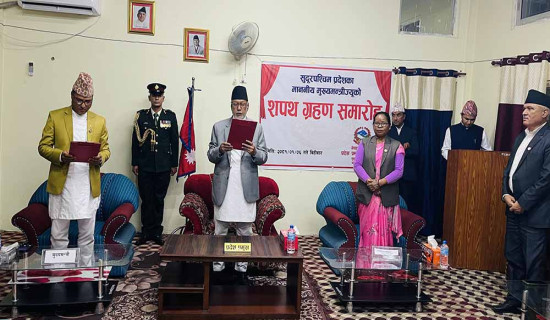- Friday, 19 April 2024
Reduce Out-Of-Pocket Health Expenses
Healthcare financing systems in low- and middle-income countries (LMIC) revolve heavily around household out-of-pocket (OOP) healthcare expenditures and lack of alternative payment systems, such as insurance. Millions of people in such countries depend on household out-of-pocket healthcare expenditures for healthcare services, and unfortunately, they are vulnerable to financial hardships owing to OOP. Therefore, household out-of-pocket healthcare expenditure at a service point is considered an unbalanced and discriminatory financing method in the healthcare system of any country.
Reaching universal health coverage and financial risk protection are important indicators to guarantee better healthy lives and higher well-being of the people. In developing countries, however, healthcare resources are inadequate to guarantee that all individuals have equal access to necessary health needs, and oftentimes, healthcare infrastructures are inadequate and overstretched. Out-of-pocket health expenses can create financial hardship by forcing people to choose either health expenses or other daily necessities (WHO, 2016).
Household income
Out-of-pocket expenditure on health can become catastrophic when it surpasses a certain threshold of a household income. Moreover, people worldwide spending more than 10 per cent of their household income on medical care increased from 9.4 per cent to 12.7 per cent from 2000 to 2015. Similarly, the population spending more than 25 per cent of their family income on health care also increased from 1.7 per cent to about 3 per cent from 2000 to 2015 (WHO, 2016). OOP as a fraction of total health expenditure is around 21. 2 per cent in high-income countries and in the South East Asia region, it is around 40.8 per cent (WHO, 2016). In Nepal, the World Bank estimated it was 57.91 per cent in 2019 (WB, 2023) which was much higher than the regional average.
Financing healthcare spending through out-of-pocket expenses has several severe unwanted consequences, such as pushing individuals and households into the poverty cycle. Most of the people, who are pushed into extreme poverty as a result of out-of-pocket healthcare expenditures, are residing in less-developed economies. Globally, about 150 million people from 44 million households annually are affected by the economic burden of household out-of-pocket healthcare expenditures and nearly more than 100 million from 25 million households are forced into a vicious cycle of poverty owing to household out-of-pocket healthcare expenditures.
The effective utilisation of healthcare services by people is also impacted by household out-of-pocket healthcare expenditures. Particularly, for people in LMIC in which on average household out-of-pocket healthcare expenditures comprise around 40 per cent of healthcare expenditure. In LMIC average household OOP healthcare expenditure per individual has increased by 66 per cent between 2000 and 2017 (WHO, 2019). The increased out-of-pocket have several implications such as economic difficulty, contributing to impoverishment, forcing households to cut their basic necessities, income loss, and forcing the household to sell their assets to finance needs for healthcare services, particularly in developing countries.
Poverty-stricken households may not even be able to afford to seek essential healthcare and remain trapped in a vicious circle of illness and poverty. The driving force of out-of-pocket health spending mainly lies in socioeconomic statuses, such as income, age, and education level of households. It has been realised, though, out-of-pocket healthcare payments are largely to be a degrading, humble, and unsustainable manner to finance healthcare. The key elements of catastrophic out-of-pocket health expenditure are found to be poor economic conditions and low living standards.
At the same time, being part of a poor household may be the reason to pay for health care out-of-pocket. Excessive out-of-pocket payments may hinder access to health care for seeking necessary medical care and thus deter them from receiving appropriate treatment at right time. Out-of-pocket expenditure on health care puts a huge burden on households and reduces their overall welfare, and it was found that poorer households were less likely to experience catastrophic out-of-pocket payments since they avoided or delayed seeking required health care. On the other hand, evidence has also suggested that low-income households oftentimes seek medical care from less qualified providers, and, as a result, face catastrophic out-of-pocket spending.
Coverage
Non-communicable diseases have been found to induce higher medical expenditure, a greater probability of catastrophic out-of-pocket healthcare spending, a more financial burden to families and households, and a higher risk of poverty. Out-of-pocket health spending was strongly related to both the problems of inefficient and unequal access to health care, particularly in low-income countries where healthcare was not covered by social health insurance. Moreover, people from LMIS were more likely to have catastrophic out-of-pocket health spending than people from higher-income countries where most of them are covered by social health insurance.
There have been several researches showing the positive impact of general health insurance on decreasing OOP expenditure. In Nepal, only about 5 per cent of the population is covered by health insurance (GoN, HIB, 2018), and one-third of them are subsidy enrollment (Ranabhat et. al, 2020). The insurance coverage is limited to essential health care services and oftentimes free medicines are not available around the year. In recent times, several private and government healthcare institutions stopped providing their services to insurers owing to delays in the repayment of insurance claims. It is, therefore, called upon all stakeholders to solve the outstanding issues and keep the public trust in the insurance scheme envisioned by the government of Nepal.
(Dr. Lohani is the clinical director at the Nepal Drug and Poison Information Centre. lohanis@gmail.com)















